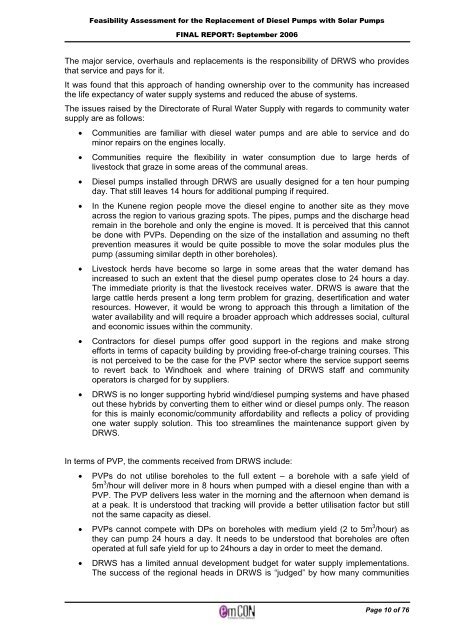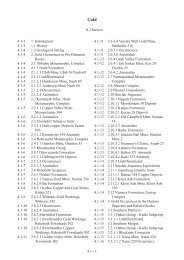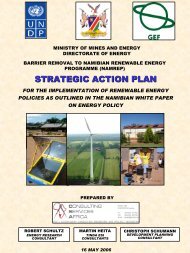Solar PV water pumping study - FINAL REPORT ... - UNDP, Namibia
Solar PV water pumping study - FINAL REPORT ... - UNDP, Namibia
Solar PV water pumping study - FINAL REPORT ... - UNDP, Namibia
You also want an ePaper? Increase the reach of your titles
YUMPU automatically turns print PDFs into web optimized ePapers that Google loves.
Feasibility Assessment for the Replacement of Diesel Pumps with <strong>Solar</strong> Pumps<br />
<strong>FINAL</strong> <strong>REPORT</strong>: September 2006<br />
The major service, overhauls and replacements is the responsibility of DRWS who provides<br />
that service and pays for it.<br />
It was found that this approach of handing ownership over to the community has increased<br />
the life expectancy of <strong>water</strong> supply systems and reduced the abuse of systems.<br />
The issues raised by the Directorate of Rural Water Supply with regards to community <strong>water</strong><br />
supply are as follows:<br />
• Communities are familiar with diesel <strong>water</strong> pumps and are able to service and do<br />
minor repairs on the engines locally.<br />
• Communities require the flexibility in <strong>water</strong> consumption due to large herds of<br />
livestock that graze in some areas of the communal areas.<br />
• Diesel pumps installed through DRWS are usually designed for a ten hour <strong>pumping</strong><br />
day. That still leaves 14 hours for additional <strong>pumping</strong> if required.<br />
• In the Kunene region people move the diesel engine to another site as they move<br />
across the region to various grazing spots. The pipes, pumps and the discharge head<br />
remain in the borehole and only the engine is moved. It is perceived that this cannot<br />
be done with <strong>PV</strong>Ps. Depending on the size of the installation and assuming no theft<br />
prevention measures it would be quite possible to move the solar modules plus the<br />
pump (assuming similar depth in other boreholes).<br />
• Livestock herds have become so large in some areas that the <strong>water</strong> demand has<br />
increased to such an extent that the diesel pump operates close to 24 hours a day.<br />
The immediate priority is that the livestock receives <strong>water</strong>. DRWS is aware that the<br />
large cattle herds present a long term problem for grazing, desertification and <strong>water</strong><br />
resources. However, it would be wrong to approach this through a limitation of the<br />
<strong>water</strong> availability and will require a broader approach which addresses social, cultural<br />
and economic issues within the community.<br />
• Contractors for diesel pumps offer good support in the regions and make strong<br />
efforts in terms of capacity building by providing free-of-charge training courses. This<br />
is not perceived to be the case for the <strong>PV</strong>P sector where the service support seems<br />
to revert back to Windhoek and where training of DRWS staff and community<br />
operators is charged for by suppliers.<br />
• DRWS is no longer supporting hybrid wind/diesel <strong>pumping</strong> systems and have phased<br />
out these hybrids by converting them to either wind or diesel pumps only. The reason<br />
for this is mainly economic/community affordability and reflects a policy of providing<br />
one <strong>water</strong> supply solution. This too streamlines the maintenance support given by<br />
DRWS.<br />
In terms of <strong>PV</strong>P, the comments received from DRWS include:<br />
• <strong>PV</strong>Ps do not utilise boreholes to the full extent – a borehole with a safe yield of<br />
5m 3 /hour will deliver more in 8 hours when pumped with a diesel engine than with a<br />
<strong>PV</strong>P. The <strong>PV</strong>P delivers less <strong>water</strong> in the morning and the afternoon when demand is<br />
at a peak. It is understood that tracking will provide a better utilisation factor but still<br />
not the same capacity as diesel.<br />
• <strong>PV</strong>Ps cannot compete with DPs on boreholes with medium yield (2 to 5m 3 /hour) as<br />
they can pump 24 hours a day. It needs to be understood that boreholes are often<br />
operated at full safe yield for up to 24hours a day in order to meet the demand.<br />
• DRWS has a limited annual development budget for <strong>water</strong> supply implementations.<br />
The success of the regional heads in DRWS is “judged” by how many communities<br />
Page 10 of 76




